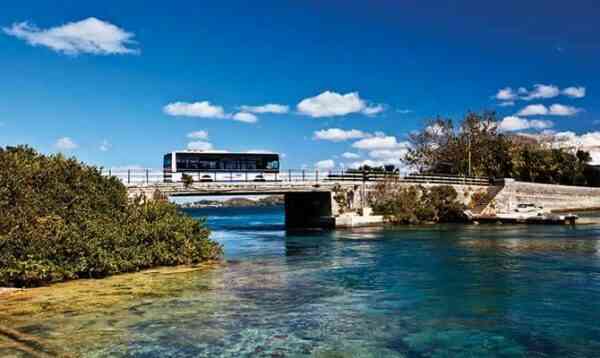The world-famous Bermuda Islands are so widely known not because of their clean beaches and beautiful nature, although all this is also here, but because of the Bermuda Triangle, shrouded in myths and legends, in which an abnormally large number of aircraft and ships are believed to disappear. The islanders themselves, however, willingly support this legend, since it attracts many tourists to the islands, which are an important source of income.
Facts about Bermuda
- They got their name in honor of the island of Bermuda.
- All the islands of the archipelago are of coral origin, that is, they are atolls.
- Bermuda consists of 181 islands and one reef.
- Bermuda is not are an independent state. Both officially and in fact they are part of the UK and belong to its overseas territories (interesting facts about the UK).
- Most of the locals are descendants of mixed marriages between Africans, who were brought here as slaves in the past, and Europeans.
- Only about twenty islands of the Bermuda archipelago have a permanent population.
- The 10 largest Bermuda The islands are connected together by a system of bridges. Together they are called «Main Island», which in English means «Main Island».
- Bermuda got its name in honor of Captain Juanes Bermudez, who was the first European to visit them.
- Despite the fact that the Spaniards discovered Bermuda, they were not interested in them. Therefore, the first settlers here were the British.
- The first Europeans were the colonists who went to the territory of the modern United States. However, they were wrecked, after which they managed to get to Bermuda, where they eventually settled.
- The total land area of all Bermuda is about 53 square kilometers.
- All the locals speak English. True, the local dialect is somewhat at odds with the English spoken in the US or the UK.
- Geologically speaking, Bermuda is very interesting. These are atolls, that is, petrified coral colonies, but now they have formed on top of an underwater volcano that has been dormant since time immemorial.
- The only plant found only in Bermuda, and nowhere else in the world, is the Bermuda juniper.
- There are no rivers or freshwater lakes. More precisely, there are still small lakes here, but the water in them is salty (interesting facts about lakes). Thus, the only source of fresh water here is rain. However, water is also brought to Bermuda by tankers.
- The most popular personal transport in Bermuda is a bicycle.
- About 65 thousand people live in Bermuda. Moreover, in the capital, Hamilton, the population is only slightly more than 1,000 people. Despite this, Hamilton is officially the only city in Bermuda.
- About 80% of all food, consumables and everything else is imported here. There is practically no production in Bermuda, and they live mainly on tourism.
- The official local currency is the Bermuda dollar, permanently pegged to the US dollar at a rate of 1:1. But American dollars are also readily accepted here (interesting facts about money).
- All of Bermuda has a little less than 250 km of roads.
- Of all the British colonies, they are the oldest.
- In the area of the Bermuda Triangle, the compass needle does not really point north due to magnetic anomalies.
- Prior to 1948, private cars were banned here.
- The aforementioned city of Hamilton, the capital of Bermuda, is the exact opposite of the Australian city of Perth – it is located on the diametrically opposite point of the globe from it.
- There are more golf courses per capita in Bermuda than in any other country in the world. They occupy about 40% of the entire land area of this country.
- Most of Bermuda’s beaches are safe for swimming, as they are fenced off from the ocean by coral reefs. However, there are poisonous jellyfish here, such as the deadly Portuguese boats (interesting facts about jellyfish).
- The highest point in Bermuda reaches only 69 meters above sea level.
- Wherever you are in Bermuda, almost everywhere you can see the ocean.
- Before the arrival of European colonists, there were never indigenous people here.
- Bermuda is considered the unofficial shipwreck capital of the world. There is no mysticism here – just navigation here is dangerous because of the numerous reefs. In the era of sailing ships, this was especially true.
